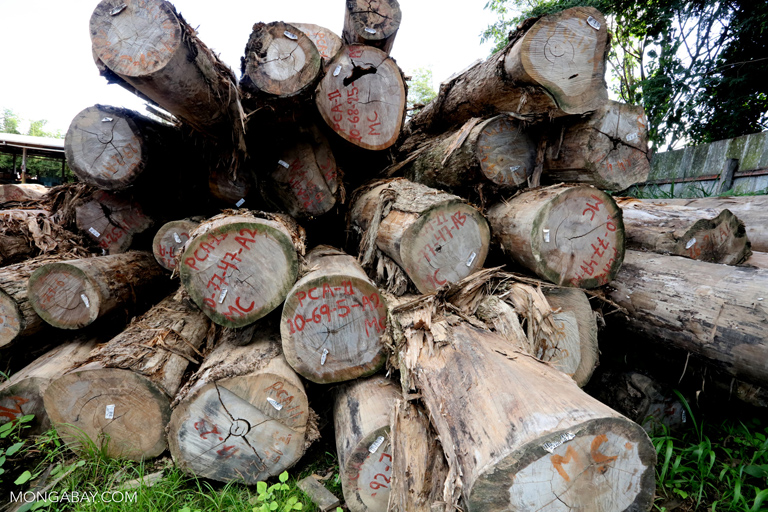- The report, released yesterday, found shortcomings of implementation and enforcement of Peru’s conservation laws majorly contributed to the export of illegal wood.
- The report comes after multiple shipments of illegal timber destined for the U.S. were intercepted.
- U.S. officials and conservationists urge Peru’s new government to increase efforts to stem the flow of illegally harvested timber.
Much of timber exported from Peru to the U.S. in January 2015 was illegally sourced, according to a verification report released yesterday by the U.S. government. The findings have prompted U.S. officials to call on Peru to step up the fight against illegal logging and trade.
The report was requested in February 2016 by U.S. Trade Representative, Ambassador Michael Froman, and produced by OSINFOR, Peru’s forest oversight agency. For the report, OSINFOR looked at data obtained through a verification program launched by the Peruvian customs authority that recorded where timber was harvested.
The agencies found 90 percent of the sampled timber exported to the U.S. had been illegally logged, according to watchdog NGO Environmental Investigation Agency (EIA).
“The report provided by Peru demonstrates that it has much more work to do to enforce its laws and to stop trade in illegally taken timber,” said Senate Finance Committee Ranking Member Ron Wyden, who initially put the investigation in motion. “Illegal timber costs American jobs and damages ecologically critical rainforest. I strongly urge Peru’s new government to promptly act on the recommendations provided by the Obama Administration today, and that U.S. Agencies — particularly U.S. Fish and Wildlife — redouble their efforts to identify and interdict illegally taken timber.”
Wyden has long been active in efforts to curtail the illegal logging trade, recently coauthoring a new law aiming to improve U.S. agency response to illegal timber imports. In 2008, Wyden amended a U.S. law called that Lacey Act that bans the trafficking of illegal wildlife to include illegally sourced plants and plant products like timber and paper. This change became the world’s first ban on illegal wood trade.

According to a U.S. government statement, the verification report includes comprehensive discussion of the deficiencies in implementation and enforcement of Peruvian forest laws.
“The key is for the Peruvian authorities to obtain the data they need to identify and stop the trade of illegally harvested timber – as well as the political will to do it,” said Lisa Handy, EIA’s Forest Campaign Director. “As Operation Amazonas has demonstrated, two pieces will be indispensable for this: the field verifications conducted by OSINFOR and a requirement for the exporter to provide data about point of harvest.
“Without these, little can be done to transform an entrenched system of laundering and impunity.”
This is not the first time shipments of illegally sourced Peruvian timber have been uncovered; this isn’t even the only instance from 2015. In September of last year, a shipment to Houston was found to contain more than 90 percent illegal timber, and U.S. customs officials barred it from sale on the U.S. market because it violated the Lacey Act. In December, the same boat was detained in Mexico after it came to light that 96 percent of its load had been illegally harvested. This was not a small shipment – it reportedly comprised enough timber to cover two city blocks, according to the EIA. These cases were highlighted by Senator Wyden when he asked the U.S. government to acquire a formal verification report.
“It is time for Peru to address this organized crime with the urgency it requires,” said Julia Urrunaga, EIA’s Peru Program Director. “Illegal logging is not just about the stolen trees and ecosystem destruction, but also about corruption, human rights violations, and the threats of violence against and assassination of brave local leaders and public officers that fight to stop it.”
